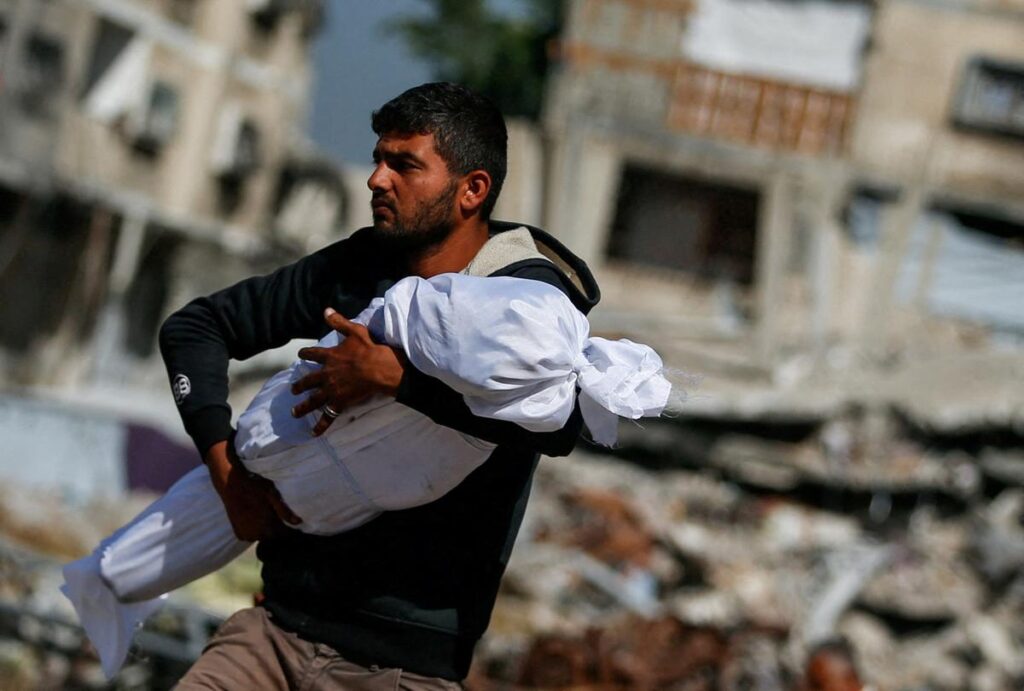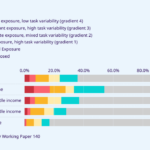By Asad Mirza
As famine looms over Gaza, with 57 children reportedly dying from the effects of malnutrition over the past 11 weeks, the Israeli operation in Gaza continues unabated. Though some western leaders have voiced concern over the fast-deteriorating situation in Gaza, no practical solution or confronting Israel for its anti-human behaviour against the Palestinians, appears to be on the horizon.
Israel is still blocking aid for Gaza despite promise to lift siege, the UN has said. Four days after Benjamin Netanyahu announced he was lifting the siege of Gaza, Israel is still blocking food from reaching starving Palestinians, the UN has said, as the leader of the country’s centre-left Democrats party said his country was becoming a pariah nation that “kills babies as a hobby”.
Only five trucks of aid had reached Gaza by Tuesday afternoon and aid workers had not been given permission to distribute even that token shipment, Jens Laerke, spokesperson for the UN Office for the Coordination of Humanitarian Affairs (OCHA) told a Geneva press briefing. Even that shipment would do little to reduce widespread hunger after 11 weeks of near total siege; it is just a fifth of what reached Gaza daily before the war, when people were well-fed.
Looming famine in the territory has provoked international outrage and heavy diplomatic pressure on Israel’s prime minister to allow food to reach more than 2 million people trapped in Gaza. On Sunday night Netanyahu announced he was ending the siege on Gaza because a “starvation crisis” would damage his country’s global standing.
Yair Golan, the leader of the opposition Democrats who served as deputy chief of staff for Israel’s military before entering politics, said that after an unjustifiably brutal campaign, much of the damage had already been done.
Netanyahu’s government was making the country as isolated as apartheid-era South Africa, he told Reshet Bet radio. “A sane country doesn’t engage in fighting against civilians, doesn’t kill babies as a hobby and doesn’t set the expulsion of a population as a goal,” he said.
According to The Guardian, for most of the war, opposition to Netanyahu among Jewish Israelis has focused on the failure to bring back hostages or the conduct of the campaign, rather than the deaths of Palestinians in Gaza, or the hunger and destruction there. The few who have focused on Palestinian suffering have faced harsh policing under the far-right security minister, Itamar Ben-Gvir.
On Monday police arrested anti-war activists who went to protest near the Gaza border holding images of Palestinian children killed in Israeli airstrikes, detaining them overnight before releasing them to house arrest. They included Alon-Lee Green, co-director of Palestinian-Israeli campaign group Standing Together.
“While peaceful demonstrators are dragged before the courts, rightwing extremist settlers are allowed to enter Gaza illegally, carry out attacks on Palestinians in the West Bank and hold settlement conferences on the Gaza border with full impunity, revealing a dangerous double standard in the state’s use of force,” Standing Together said in a statement.
Meanwhile, the UN has rejected a new US-Backed Gaza Aid Planas it says the plan is not impartial or neutral, and it (UN) won’t be involved. A US-backed organisation, Gaza Humanitarian Foundation (GHF), plans to oversee aid distribution in Gaza by end-May, but the UN rejected the model as biased. The foundation, with $100 million in commitments, aims to deliver aid via secure sites, while Israel assists.
The United Nations says the US-backed distribution plan does not meet its long-held principles of impartiality, neutrality, and independence. UN aid chief Tom Fletcher has said time should not be wasted on the alternative proposal. Israel stopped all aid deliveries to Gaza on March 2 after accusing Hamas of stealing aid, which the Palestinian militants deny.
In early April, Israel proposed what it described as “a structured monitoring and aid entry mechanism” for Gaza. It was swiftly rejected by UN Secretary-General Antonio Guterres, who said it risked “further controlling and callously limiting aid down to the last calorie and grain of flour.”
Since then, pressure had been growing on Israel to allow aid deliveries to resume. A global hunger monitor last week warned that half a million people face starvation – about a quarter of the population in the enclave – and US President Donald Trump acknowledged that “a lot of people are starving in Gaza.”
Amid the stalemate over Israel’s plan, Washington backed the newly-created GHF to oversee aid distribution. Netanyahu further vowed that the entire Gaza Strip would be under Israeli security control by the end of the war, and he insisted that his plans for private US companies to deliver aid would prevent a humanitarian crisis there, despite aid agencies and many governments saying such a crisis already exists.
But international pressure on Israel has continued to grow. According to BBC, The UK said it would be suspending trade talks over what it described as Israel’s “morally unjustifiable” military escalation in Gaza, with Prime Minister Sir Keir Starmer describing the situation as “intolerable”.
Earlier this week, the leaders of the UK, France and Canada issued a statement calling on the Israeli government to “stop its military operations” and “immediately allow humanitarian aid to enter Gaza”. The UK, France and Canada have warned Israel they will take “concrete actions” if it continues an “egregious” expansion of military operations in Gaza.
The three Western leaders criticised this as “wholly inadequate” as the “denial of essential humanitarian assistance to the civilian population is unacceptable and risks breaching International Humanitarian Law”. They added the level of suffering in Gaza was “intolerable”.
They also condemned “the abhorrent language used recently by members of the Israeli Government, threatening that, in their despair at the destruction of Gaza, civilians will start to relocate, permanent forced displacement is a breach of international humanitarian law.” they added.
Arabella Duffield, a public health expert and trustee of a philanthropic foundation in Israel told Financial Times that none of this misery is the fault of the children of Gaza, where almost half the remaining population is under 18, an age group at higher risk of death from malnutrition. No child anywhere should be deliberately deprived of food and no child should be forced to starve. And yet, the Israeli government’s decision to block all aid since March 2 until its announcement on Sunday was, in practice, a decision to make innocent civilians pay the price for Hamas’s actions, which they have no control over and no freedom to challenge — assuming they are even old enough to do so.
Arabella further said that if food supplies do not increase significantly, nearly 71,000 children under the age of five are expected to be acutely malnourished over roughly the next year with rates of acute malnutrition rising.
Indeed, one wonders what is holding back the international community for not taking a concerted action against Israel for its anti-human and barbaric activities against the unarmed, innocent Palestinians, despite so much proof of Israeli aggression against them. (IPA Service)

 One In Four Jobs Globally Is Exposed To Generative AI
One In Four Jobs Globally Is Exposed To Generative AI 